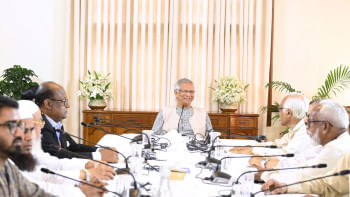Pvt sector, bigger budget vital for better healthcare

Greater private sector involvement and increased budget allocation are essential to improve healthcare in Bangladesh, said speakers at a programme yesterday.
At the programme, a top BNP leader said if voted to power, they would deregulate the private sector. In contrast, an aide to the chief adviser stressed that the government must regulate healthcare to protect public interest.
The views were shared at the Bangladesh Health Conclave 2025, organised by the Bangla daily Bonik Barta, in association with Square Hospital Ltd, United Healthcare, LABAID, and Beacon Pharmaceuticals PLC as sponsors.
Health experts, officials, businessmen, and politicians attended the event, held at a city hotel.
In some places, there are buildings but no doctors; in others, there are doctors but no nurses or technicians. Coordination is necessary, and involving the private sector can help improve the situation.
Asif Saleh, executive director of BRAC Bangladesh, said out-of-pocket health expenditure in Bangladesh is Tk 74 -- one of the highest in the world.
He said thousands of crores have been spent on infrastructure projects, but primary healthcare has not received enough attention. He called for greater investment in primary healthcare.
Syed Abdullah Muhammad Taher, nayeb-e-ameer of Jamaat-e-Islami, stressed the need for higher budget allocation and policies to support private sector growth.
He said pharmaceutical companies are forced to spend heavily on product promotion.
After he said so, a member of the audience protested, claiming doctors do not take the money.
In response, Taher clarified that he did not accuse doctors but maintained that companies spend significantly on promotion.
During the exchange, Prof Sayedur Rahman, special assistant to the chief adviser for the health ministry, briefly left the stage. He later returned at the organisers' request to continue the session.
BNP Standing Committee member Amir Khosru Mahmud Chowdhury said Bangladesh has topped the list of South Asian countries in terms of social indicators but failed to make similar progress in health.
He said the demographic dividend cannot be utilised without greater investment in healthcare, adding that if BNP comes to power, they will allocate 5 percent of GDP to health.
He said the private sector should be freed from government control, promising "serious regulatory liberalisation," and urged businessmen to prepare for self-regulation.
Prof Sayedur Rahman, representing the interim government, said no decision is made without stakeholder consultation and that the government will ensure a congenial environment for private investment.
He noted that even the US, despite being a champion of liberalism, regulates its health sector.
"The government that comes next may deregulate, but no country leaves its health sector unregulated. We will regulate -- but regulation will not be repressive," he said.
Joining virtually, Planning Adviser Prof Wahiduddin Mahmud said there is a crisis of public trust in the country's healthcare system, leading many to spend huge sums abroad, which burdens the economy. He pointed out that many large government-built infrastructures remain unused.
"In some places, there are buildings but no doctors; in others, there are doctors but no nurses or technicians. Coordination is necessary, and involving the private sector can help improve the situation," he said.
He also suggested considering private management for small healthcare clinics.
AM Shamim, general secretary of Bangladesh Private Hospital, Clinic and Diagnostic Owners Association, said they need approval from 18 agencies for licence renewal, calling it a form of "torture". He urged simplification of the process.
Prof Md Abu Jafor, director general of the Directorate General of Health Services, said the private sector provides 70 percent of health services in the country and the government alone cannot strengthen the system.
Tapan Chowdhury, managing director of Square Pharmaceuticals Ltd, emphasised recognising the contributions of the private sector.
Saidur Rahman, secretary of the Health Services Division, said many unused medical facilities can be made functional by involving private actors.
Md Mosaddeque Hossain Biswas, president of Bangladesh Medical University, and Prof Md Shahinul Alam, vice chancellor of Bangladesh Medical University, also spoke, among others.
The event was moderated by Bonik Barta Editor and Publisher Dewan Hanif Mahmud.

 For all latest news, follow The Daily Star's Google News channel.
For all latest news, follow The Daily Star's Google News channel. 



Comments